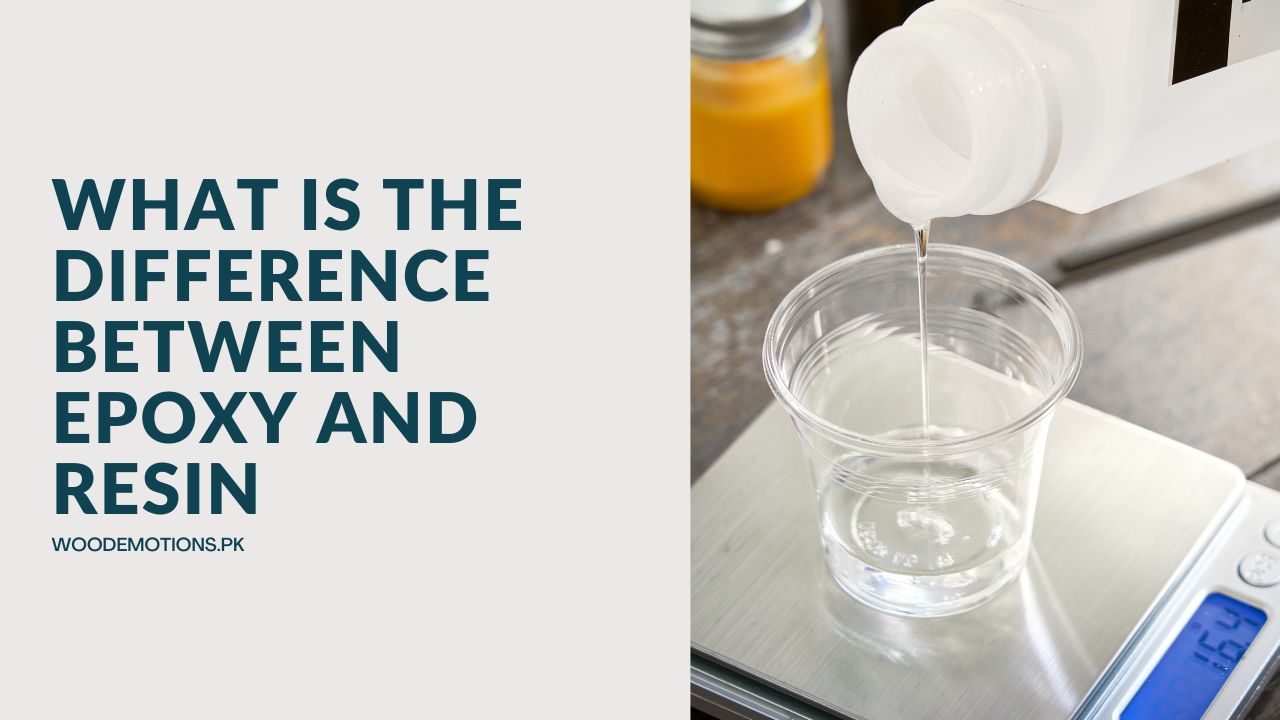Epoxy and resin are commonly used materials with diverse applications across various industries and artistic endeavors. While they share similarities in their liquid-to-solid transformation processes, they differ significantly in their chemical compositions, properties, and environmental impacts.
Epoxy resins are primarily used for coating while casting resins are intended for molding applications such as creating figurines and jewelry.
This article will explore the differences between epoxy and resin, examining their composition, characteristics, applications, and environmental impacts. By gaining insight into these materials, readers can make informed decisions regarding their usage and disposal, contributing to sustainable practices in both industrial and artistic settings.
Before we get into further detail explore our :|
Epoxy |
Resin |
|
Strong, durable polymer made from epoxides and curing agents |
Liquid or semi-liquid material that hardens into a solid |
|
Exceptional strength, toughness, and resistance to chemicals, heat, and water |
Characteristics vary from clarity, flexibility to adhesion |
|
Forms a hard and rigid material once cured |
Used in diverse applications including industrial, crafts, and construction |
Applications Of Epoxy
1. Industrial Uses
Epoxy is used in industries that manufacture electronic components, coat metal surfaces to prevent corrosion, and produce composite materials for aerospace and automotive industries. Its adhesive solid properties are valuable for bonding metals, ceramics, and plastics.
2. Construction Applications
In construction, epoxy is an adhesive for bonding materials like concrete, wood, and fiberglass. It's also used as a durable coating for floors, countertops, and walls and for structural repairs like sealing cracks and reinforcing weakened structures.
3. Art and Crafts
Epoxy resin is popular in art and crafts for making decorative items, jewelry, and artwork. Its clarity and ability to encapsulate objects make it ideal for resin jewelry, coasters, and tabletops. Artists also use epoxy resin to coat paintings and create three-dimensional effects.
Applications Of Resin
1. Artistic Applications
Resin is widely used in jewelry making, painting, and mixed-media artworks. It embeds gems and beads in jewelry, creates glossy finishes in paintings, and adds depth and texture to artworks with vibrant and intricate designs.
2. Industrial Applications
Resin is employed in casting, molding, and laminating processes in industries such as aerospace, marine, and automotive. It offers lightweight and corrosion-resistant alternatives to traditional materials like metal and wood.
3. Construction and Repairs
In construction, resin fills gaps, reinforces structures, and waterproofs surfaces. It's used for repairing cracks in concrete, sealing joints in pipelines, and bonding materials for strong and durable connections.

I provided this forum, as you can find additional information about epoxy resin and its differences on this forum link. Feel free to explore the discussions and gather more insights. If you have any further questions, feel free to ask!
Also Read : Is epoxy Waterproof?
Properties of Epoxy
1. Strength and Durability
Epoxy is known for its exceptional strength and durability once cured. It forms a stiff and rigid material that can withstand heavy loads and impacts, making it suitable for structural applications.
2. Heat Resistance
Epoxy exhibits good heat resistance, allowing it to maintain strength and integrity even at elevated temperatures. This property makes it suitable for use in environments where heat is a factor, such as industrial settings and automotive applications.
3. Chemical Resistance
Epoxy is highly resistant to chemicals, including acids, alkalis, and solvents. This property makes it ideal for use in environments where exposure to harsh chemicals is common, such as laboratories, chemical plants, and manufacturing facilities.
Properties of Resin
1. Clarity and Transparency
Resin is prized for its clarity and transparency, giving it a glass-like appearance when cured. This property is ideal for artistic applications such as jewelry making and painting, where visual aesthetics are important.
2. Flexibility
Resin exhibits a degree of flexibility once cured, allowing it to bend and stretch without breaking. This property makes it suitable for flexible applications like coatings and laminates.
3. UV Resistance
Some resins are formulated to be UV resistant, meaning they can withstand exposure to sunlight without yellowing or degrading. This property makes them suitable for outdoor applications such as coatings for outdoor furniture, boats, and surfboards.
I'm including YouTube videos here for your ease and convenience, aimed at providing additional detailed information to enhance your understanding.
Curing Process of Epoxy
- Epoxy undergoes polymerization when mixed with a hardener, forming long chains of polymers.
- Factors like temperature and humidity affect curing, with higher temperatures speeding up the process. Once cured, epoxy becomes hard and durable.
Curing Process of Resin
- Resins transform from liquid to solid through a curing process involving catalysts or hardeners.
- This process includes chemical reactions like cross-linking of polymer chains, influenced by factors such as temperature and humidity.
- Once cured, resin gains desired properties like hardness or flexibility.
Here is another forum link I'm adding just for your convenience. My sole purpose is to provide you with complete information, so please feel free to explore the discussions on the forum. If you have any further questions, I'm here to help!
Epoxy Environmental Impact

Let's discuss the environmental impact of epoxy and resin. Epoxy resins can yield both positive and negative environmental effects, considering factors like durability and production-related pollution.
1. Disposal Considerations
Disposing of epoxy can be challenging as it is not readily biodegradable. Improper disposal, such as dumping in landfills or water bodies, can lead to environmental pollution.
2. Environmental Hazards
Epoxy production and usage can release harmful chemicals and volatile organic compounds (VOCs) into the environment. These pollutants can contribute to air and water pollution, affecting ecosystems and human health.
Resin Environmental Impact
1. Biodegradability
Some types of resin are biodegradable, meaning they can break down naturally over time with the help of microorganisms. However, many synthetic resins are not readily biodegradable, posing challenges for environmental management.
2. Environmental Impact
Resin production and disposal can have various environmental impacts, including resource depletion, energy consumption, and pollution. Improper disposal of resin waste can lead to soil and water contamination, affecting ecosystems and wildlife.
Now that you have a clearer understanding of the difference between epoxy and resin, additional resources from forums or YouTube can further assist you in exploring the topic. Here are some frequently asked questions (FAQs) that I believe are essential for you to know:
FAQs
How do you properly mix epoxy resin and hardener for optimal curing results?
The proper mixing ratio of epoxy resin and hardener is crucial for achieving optimal curing results. Typically, manufacturers provide specific mixing ratios, which should be followed precisely to ensure proper curing and optimal performance of the epoxy resin.
What are some common uses of epoxy resin in construction and manufacturing industries?
Epoxy resin is commonly used as an adhesive, coating, and composite material in various industries. It is widely used in construction for bonding materials, sealing cracks, and coating surfaces due to its strength, durability, and chemical resistance.
Are there any safety precautions to consider when working with epoxy resin, especially regarding ventilation and skin contact?
Yes, it's important to work in a well-ventilated area when using epoxy resin to prevent inhalation of fumes. Additionally, wearing protective gloves and clothing can help prevent skin contact, as epoxy resin can cause irritation or allergic reactions in some individuals.
What factors influence the curing time of epoxy resin, and how can they be controlled for desired results?
Factors such as temperature, humidity, and the specific formulation of the epoxy resin can influence curing time. Higher temperatures generally accelerate curing, while lower temperatures slow it down. Controlling these factors and following manufacturer guidelines can help achieve desired curing times.
Can epoxy resin be colored or tinted, and what are the best practices for achieving desired colors and effects?
Yes, epoxy resin can be colored or tinted using compatible pigments or dyes. It's important to use pigments specifically designed for use with epoxy resin and to follow manufacturer recommendations for proper mixing ratios and application techniques to achieve desired colors and effects.
In Conclusion
Epoxy resins are predominantly used for coating applications, whereas casting resins are tailored for molding purposes such as crafting figurines and jewelry. However, it's worth noting that both can serve alternate functions, a topic we've explored further in this article.








